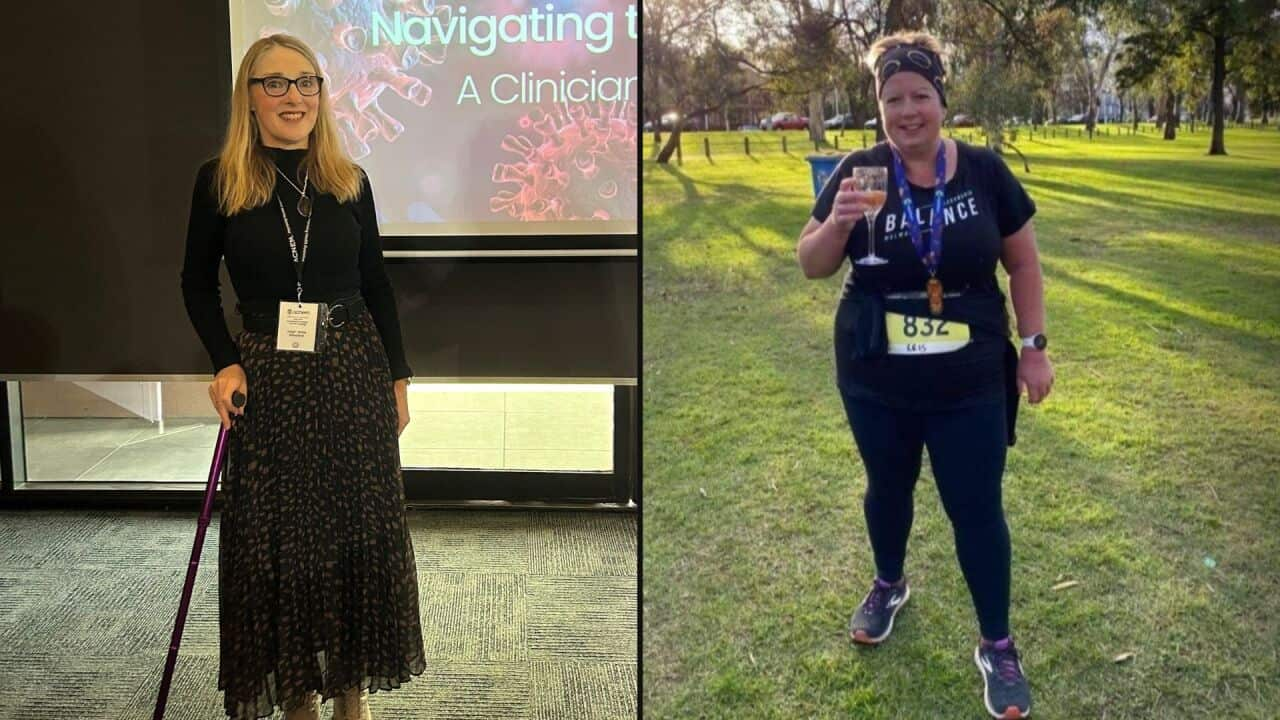Key Points
- Memory loss, forgetfulness and trouble concentrating are some of the main symptoms of long COVID.
- Cognitive impairment, or 'brain fog' can be debilitating and leave people unable to work or study.
- Researchers are attempting to identify biomarkers to try understand the causes and develop treatments.
Leigh-Anne Sharland had always been a high performer at work, but last year everything changed.
She had an adverse reaction to a COVID-19 booster in February 2022 and a few months later she caught the virus.
Now, she can no longer work and struggles with everyday activities due to ongoing cognitive impairment - commonly referred to as 'brain fog'.
Her symptoms have made it impossible to function at her previous level both professionally and socially.
"I've had to leave my job after being at the leading edge of data and using computers since they were first introduced to banking," she said.
"Now I can't use a computer without getting extremely exhausted, and taking far, far longer than I used to."
She struggles with Zoom calls, reading, and sometimes verbal communication and remembering words.
"I am embarrassed when people ask me how am I; I lie and say 'okay'," she said.
"But I am not okay."

Leigh-Anne Sharland had to leave her job due to ongoing cognitive impairment after she contracted COVID-19. Source: Supplied / Leigh-Anne Sharland
"Before this all happened I was extremely mobile, a workaholic and a thought leader in my field of expertise," she said.
"I lost my identity. My job was my identity and I have had to go through grieving that."
For Sharland, these cognitive issues are symptoms of long COVID, which she was diagnosed with after extensive testing.
According to the Department of Health and Aged Care, problems with memory and concentration - also referred to as 'brain fog' - are some of the most common symptoms of long COVID, along with shortness of breath and fatigue.
Now, researchers are trying to understand why some people experience these debilitating cognitive issues.
What is 'brain fog'?
Cognitive impairment, or 'brain fog', is complex and can look different for everybody.
Catherine Bennett, chair of epidemiology at Deakin University, said the condition can be temporary and mild, or continue long-term and prevent people from being able to work and function at their normal level.
"It can be things as simple as poor concentration ... but it can be more disabling, it can be feeling confused, or being very slow in thinking, it can mean forgetfulness or mental fatigue, or not finding the right words," she said.
"It can really start to interfere in day-to-day activities."
Why do some people develop cognitive impairment after COVID-19?
The reasons for some people developing cognitive impairment after contracting COVID-19 are not yet clear.
A new study published by Nature Medicine has inspected substances in blood, called biomarkers, to try to predict COVID-19 patients' likelihood of going on to develop cognitive problems.
Researchers examined more than 1,800 British people hospitalised with COVID-19 between early 2020 and late 2021 who had self-reported issues and had cognition tests with clinicians six and 12 months after hospitalisation.
They identified two possible biomarkers, which the researchers said was promising, but said further work is needed to develop the necessary testing.
Marie-Claire Seeley is a clinical nurse and PhD candidate at the University of Adelaide who has done extensive work and research in post-viral conditions.
She said there were numerous limitations in the biomarker study, including the cohort studied and a lack of information on their previous cognitive state.
"I don't think we can draw, from this, conclusions about the reason for cognitive dysfunction in long COVID, nor can we draw general conclusions about long COVID itself from this population," she said.
Bennett said understanding biomarkers could help identify risk factors and recognise groups of people who might be at risk of long COVID and ongoing cognitive issues.
“Biomarkers can be really important to help identify who they are and look at the risk factors that put people in that group, allow us to get a measure of burden and know how many people fall into that group,” she said.
“And also, importantly, help us understand some of the mechanisms of the condition that could point to other ways to help with therapy.”
'There's just not enough research'
Kristen Fraser was a fit and healthy primary school teacher before she contracted COVID-19 in January 2022.
The 42-year-old became quite ill and had trouble breathing, and was monitored by medical professionals and put on medication.
A year and a half later, she has still not recovered and continues to experience exhaustion and cognitive issues.

Kristen Fraser was active and healthy before contracting COVID-19 in January 2022. Source: Supplied / Kristen Fraser
"I've always been a quick thinker, I've always had a good memory and been able to memorise all sorts of things, and being a teacher you've got to be on your A-game all the time," she said.
"It is really depressing."
Fraser said she would welcome any research into long COVID and cognitive impairment.
"Anything that might look at reasons why people get long COVID or how they can climb their way out of it would be helpful.
"There's just not enough research ... we need more trials so there's some kind of light at the end of the tunnel."












